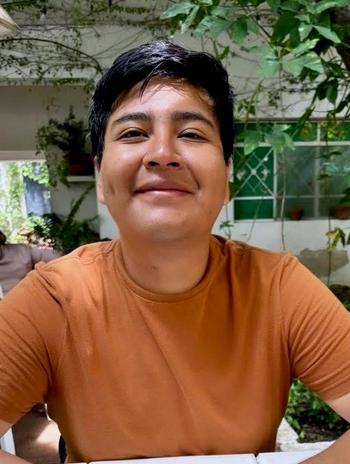Edgar Delgado Hernández

International Research Training Group 'Temporalities of Future in Latin America'
PhD Candidate
Social Sciences
Project: "Political Ecology of Water Suffering in the Financialized Periphery: An Analysis of the Santa Teresa Urban Development, Huehuetoca, State of Mexico"
Education
| Since 09/2022 | PhD student in Social Sciences, research line in Environment and Society, CIESAS-Occidente, Mexico. |
| 09/2019 – 09/2021 | Master's Degree in Social Anthropology, research line in Medical Anthropology, CIESAS-South Pacific, Mexico. |
| 08/ 2012 – 18/2018 | Bachelor's degree in Sociology, line of research in Political Sociology, Autonomous University of the State of Mexico (UAEMex). |
Work experience
| Since 05/2025 | Researcher, International Research Training Group ‘Temporalities of Future’, Berlin |
| 01/2021 – 12/2023 | Associate Researcher, Center for Research and Higher Studies in Social Anthropology (CIESAS-PS). |
| 04/2019 – 01/2020 |
Academic Assistant, at the National Autonomous University of Mexico (UNAM). |
| 01/2018 – 04/2019 |
Research Assistant, Center for Research and Higher Studies in Social Anthropology (CIESAS-CDMX). |
| 04/2017 – 12/2018 | Research Assistant, Center for Economic Research and Teaching (CIDE), Mexico. |
| 05/2014 – 08/2016 | Research Assistant, National Council of Science and Technology (Conacyt), Mexico. |
| 03/2014 – 08/2014 | Research Assistant, Center for Economic Research and Teaching (CIDE), Mexico. |
Project: "Political Ecology of Water Suffering in the Financialized Periphery: An Analysis of the Santa Teresa Urban Development, Huehuetoca, State of Mexico."
My doctoral research project explores how inequalities in water access are structured in peripheral urban areas—linked to the process of financialization in Latin America—and how residents experience and persist under these unequal conditions. I focus on Santa Teresa, a housing development built under the Bicentennial Cities program (2007-2009), located in the Metropolitan Zone of the Valley of Mexico, which has lacked regular water access since 2012.
I seek to answer three key questions: 1) How does the production of these urban spaces shape water scarcity? 2) How do residents experience "water suffering"? 3) What water-persistence strategies do they develop, particularly women, who play a crucial role in the daily management of water and in negotiations with various state actors?
To address these questions, I develop a theoretical-methodological framework I call the political ecology of water suffering, which integrates perspectives from political ecology, social suffering studies, and intersectional approaches.
This framework allows me to analyze how global dynamics —such as financialization driven by international institutions— intersect with local experiences, producing socio-environmental injustices. I employ ethnography to capture residents’ everyday narratives and practices, as well as to map the power networks that perpetuate these inequalities. My research aims not only to make these issues visible but also to contribute to broader debates on water justice and the right to adequate housing.
Chapters (selection)
Castillo Oropeza, O. A., & Delgado Hernández, E. (2024). Prolegomena for a political ecology of socio-environmental suffering in Latin America. In O. Castillo Oropeza & D. Roca-Servat (Eds.), Political ecology, socio-environmental suffering and political action (pp. 27-46). CLACSO. https://libreria.clacso.org/publicacion.php?p=3192&c=5
Delgado Hernández, E. (2024). Between deception and uncertainty: experiences of suffering and injustice due to exposure to radioactive waste in the periphery of the metropolis of Mexico. In L. Chavez-Rodriguez, I. Rubio C., and C. Ruiz de la Oña P. (Eds.), Environmental Justice in Latin America: Between Violence and Resistance. (pp. 61-45) EnJust Network / CAU University of Kiel.
Delgado-Hernández, E. (2023). Socio-territorial stigmatization: an ethnographic account of suffering from radioactive waste, the case of the Temascalapa Radioactive Waste and Storage Center, Mexico. In Castillo Oropeza, O. A. and Carillo Salgado, M. (Cord,), Community interpellations on sufferings and grievances. Ethnographic Essays, Life Stories and Interviews, p. 93-120, Intercultural University of the State of Hidalgo. Solar, servicios editoriales, S, A. de C. V.: Mexico.
Castillo-Oropeza, O. A. & Delgado-Hernández, E. (2023). Financialized periphery, water suffering and microprivatization of water in the Metropolitan Area of the Valley of Mexico. In Salinas Arreortua, L. A., Carmona Rojas, M. Y. and O. A. Castillo Oropeza (Cord.), Urban peripheries in Latin America. Theoretical and methodological challenges for sociopolitical action, p. 119-147, Institute of Geography, National Autonomous University of Mexico: Mexico.
Articles (selection)
Delgado Hernández, E. (2023) Vulnerability and social suffering in the exercise of indigenous midwifery in Mexico. Ichan Tecolotl. CIESAS. (34)364, https://ichan.ciesas.edu.mx/vulnerabilidad-y-sufrimiento-social-en-el-ejercicio-de-la-parteria-indigena-en-mexico/
Delgado Hernández, E., & Sesia, P. (2023). Radioactive waste policies and social perception of risk in two communities in the State of Mexico, Mexico. Alter(15), 1-25. https://periodicos.ufpb.br/ojs/index.php/altera/article/view/66677
Castillo Oropeza, O. A., & Delgado Hernández, E. (2022). Ecologia política e micro-privatização da água: Um breve olhar sobre a periferia da Cidade do México. Das Amazônias, 5(01), 17–23. https://doi.org/10.29327/268903.5.1-4
Castillo-Oropeza, O. A. & Delgado Hernández, E. (2022). From normative sustainability to practical sustainability: Nature and territory in the Tepehua people, Hidalgo, Mexico. Cuadernos del Sur. Journal of Social Sciences. 53, p. 6- 26. https://cuadernosdelsur.com/wp-content/uploads/2022/07/01-DE-LA-SUSTENTABILIDAD-NORMATIVA-A-LA-SUSTENTABILIDAD-PRACTICA.pdf
Castillo-Oropeza, O. A. & Delgado Hernández, Edgar. (2022). Political ecology of the pandemic: Suffering and political action of indigenous peoples caused by COVID-19 in the Otomí-Tepehua region, Mexico. Political ecology. Cuadernos de debate Internacional. 62, p. 114-118. https://www.ecologiapolitica.info/?p=15235
Delgado-Hernández, Edgar. (2021). Vulnerable experiences and risk in fieldwork in the context of the COVID-19 health contingency. Ichan Tecolotl. CIESAS. (36), P. 1-6 https://ichan.ciesas.edu.mx/experiencias-vulnerables-y-riesgo-en-el-trabajo-de-campo-ante-el-contexto-de-la-contingencia-sanitaria-de-covid-19/
Castillo Oropeza, O. A., & Delgado Hernández, E. (2021). Political ecology of suffering from radioactive waste: a case study in Temascalapa, Mexico. Green Letters. Latin American Journal of Socio-Environmental Studies, (30), 163-184. https://doi.org/10.17141/letrasverdes.30.2021.4792
Castillo-Oropeza, O. A. & Delgado-Hernández, E., & García-Morales Á. (2018). Gentrification and disaster in the La Condesa Area. Bitácora Urbano Territorial, 28(2), p. 35–43. DOI: https://doi.org/10.15446/bitacora.v28n2.70157.
Book Reviews
Hernández, E. D., (2025) "Review of the book by Castillo Oropeza and D. Roca-Servat (Coords.). 2024. Political Ecology, Socio-Environmental Suffering, and Political Action," Journal of Political Ecology 32(1): 6405. doi: https://doi.org/10.2458/jpe.6405
Delgado Hernández, E. (2025). Urban peripheries in Latin America. Theoretical and methodological challenges for socio-political action. Demographic and Urban Studies, vol. 40.
Delgado Hernández, E. (2024). On sufferings, grievances and methodological sensitivity in the social sciences. Journal of Social Anthropology, 33(1), 127-128. https://doi.org/10.5209/raso.92537


